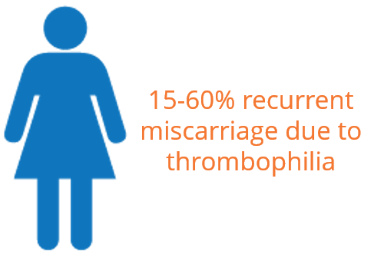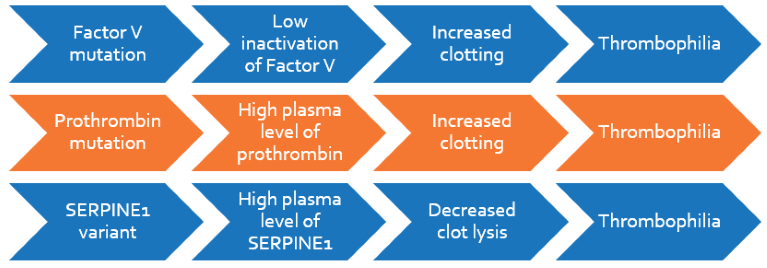 Improve success rates in case of pregnancy complications
Improve success rates in case of pregnancy complications
If case of recurrent miscarriages (abortions), preeclampsia or Intrauterine growth restriction (IUGR), this test can help you.
Abortion, miscarriage, preeclampsia, IUGR
15-60% of all recurrent miscarriages are due to thrombophilia, also known as hypercoagulability. This condition can also cause high blood pressure during pregnancy (preeclampsia), intrauterine growth restriction, and IVF implantation failure. Several blood clotting factors are elevated in the event of pregnancy due to hormonal changes. In addition, mutations in three genes involved in blood clotting (coagulation) are major causes of complications. Assess these risk factors to use targeted therapy.
Tailored therapy with anti-thrombotics
These genetic variations considerably increase the risk of thrombophilia by 4-80 fold. This condition can be assessed by testing for these variants in order to use personalized treatment and help prevent miscarriages, preeclampsia and IUGR. This can significantly improve your chances of a successful pregnancy.
Patients without genetic variants may need further biochemical tests. In the absence of additional risk factors, use of anti-thrombotic drugs may be avoided during pregnancy.
Genetics of thrombophilia, and FAQs
Thrombophilia refers to the increased tendency of blood to clot. There are several proteins involved in the coagulation cascade and among them Factor V and Factor II (prothrombin) are genes that code for clotting factors, and SERPINE1 (PAI-1) encodes an inhibitor of fibrinolysis (prevents blood clots). Mutations in Factor V (Leiden mutation), Factor II, or SERPINE1 lead to 4-80 -fold increased risk of thrombosis. Patients need treatment during pregnancy and may need to continue to prevent venous thrombosis and the risk of developing cardiovascular disease or stroke.
The test detects specific mutations in Factor V (1691G>A), Factor II (20210G>A), and SERPINE1 (4G/5G promoter) to determine risk of thrombophilia by allele-specific real-time PCR. The method has nearly 100% analytical accuracy and sensitivity. However, other mutations or factors leading to thrombophilia are not tested.

References
British Society of Haematology 2011, (Clinical guideline in) British Journal of Haematology
American Society for Reproductive Medicine 2012, (Committee opinion in) Fertility and Sterility
Royal College of Gynaecologists and Obstetricians 2011, Green-top Guideline 17
